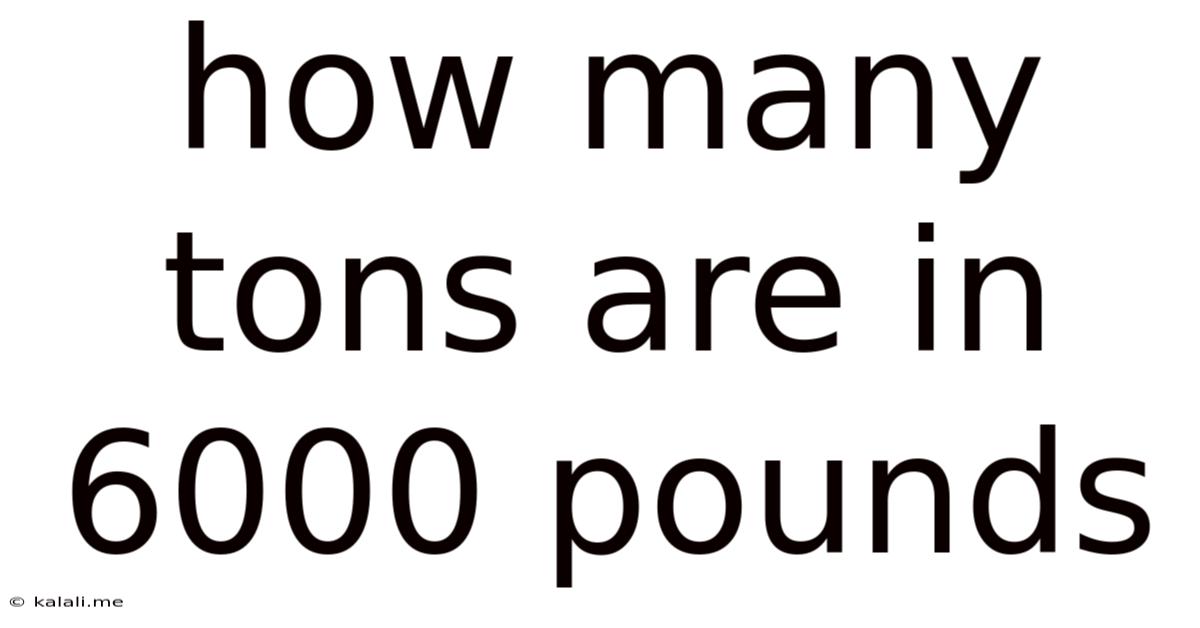How Many Tons Are In 6000 Pounds
Kalali
Jul 20, 2025 · 4 min read

Table of Contents
How Many Tons Are in 6000 Pounds? A Comprehensive Guide to Weight Conversion
This article will delve into the conversion of pounds to tons, specifically addressing the question: how many tons are in 6000 pounds? We'll explore the different types of tons, the conversion process, and provide practical examples to solidify your understanding. Understanding weight conversions is crucial in various fields, from engineering and construction to shipping and logistics. This guide aims to provide a comprehensive understanding of this essential calculation.
Understanding the Different Types of Tons
Before we jump into the calculation, it's essential to understand that the term "ton" isn't universally defined. There are primarily three types of tons:
- Short Ton (US ton): This is the most common type of ton used in the United States and equals 2000 pounds.
- Long Ton (UK ton): Primarily used in the United Kingdom and some Commonwealth countries, a long ton equals 2240 pounds.
- Metric Ton (tonne): This is the most widely used ton globally and is equivalent to 1000 kilograms, which is approximately 2204.62 pounds.
The distinction between these ton types is critical because using the wrong conversion factor will lead to inaccurate results. Always clarify which type of ton is being used to avoid confusion and errors.
Converting 6000 Pounds to Different Ton Types
Now, let's convert 6000 pounds into the different ton types:
1. Converting 6000 Pounds to Short Tons:
Since a short ton equals 2000 pounds, we can perform the following calculation:
6000 pounds / 2000 pounds/short ton = 3 short tons
Therefore, there are 3 short tons in 6000 pounds.
2. Converting 6000 Pounds to Long Tons:
A long ton is equivalent to 2240 pounds. The calculation is as follows:
6000 pounds / 2240 pounds/long ton ≈ 2.678 long tons
Therefore, there are approximately 2.678 long tons in 6000 pounds.
3. Converting 6000 Pounds to Metric Tons:
A metric ton (tonne) equals 1000 kilograms, or approximately 2204.62 pounds. The calculation is:
6000 pounds / 2204.62 pounds/metric ton ≈ 2.72 metric tons
Therefore, there are approximately 2.72 metric tons in 6000 pounds.
Practical Applications and Examples
Understanding these conversions is vital in numerous real-world scenarios. Here are a few examples:
-
Shipping and Logistics: If you're shipping goods internationally, knowing the weight in metric tons is crucial for customs declarations and freight calculations. Incorrect weight conversions can lead to delays, extra charges, and even legal complications.
-
Construction and Engineering: In construction projects, accurate weight calculations are essential for structural integrity. Knowing the weight of materials in tons is vital for load-bearing calculations and ensuring the safety of the structure. For example, calculating the weight of concrete, steel, or other building materials often requires converting pounds to tons.
-
Agriculture: Farmers often need to calculate the weight of harvested crops or feed in tons for efficient storage, transportation, and sale. Understanding the weight in different ton types ensures accurate record-keeping and market pricing.
-
Waste Management: Waste disposal companies often use tons as a unit of measurement for waste materials. Accurate weight calculations are critical for billing, transportation, and managing landfill capacity.
Common Mistakes to Avoid
When converting pounds to tons, several common mistakes can lead to inaccurate results:
-
Failing to specify the type of ton: As discussed earlier, failing to specify whether you are using short, long, or metric tons is a significant source of error. Always clarify the type of ton being used.
-
Using the wrong conversion factor: Using the wrong conversion factor (e.g., using the short ton conversion factor when dealing with metric tons) will inevitably result in incorrect calculations. Double-check your conversion factors before performing any calculations.
-
Rounding errors: When dealing with decimal values, rounding errors can accumulate and lead to significant inaccuracies, especially in large-scale projects. It's crucial to retain sufficient decimal places during calculations to minimize errors.
Advanced Calculations and Considerations
For more complex scenarios, you might need to consider additional factors:
-
Density: When dealing with materials with varying densities, you need to consider the volume and density to accurately determine the weight. This is especially relevant in fields like engineering and materials science.
-
Bulk Density: This is relevant when dealing with loose materials like grain or sand, where the weight per unit volume can vary depending on how tightly packed the material is.
-
Tare Weight: In shipping and logistics, tare weight refers to the weight of the container or packaging itself. The net weight (the weight of the goods) is obtained by subtracting the tare weight from the gross weight.
Conclusion:
Converting pounds to tons requires careful consideration of the different ton types. Understanding the distinctions between short tons, long tons, and metric tons is paramount to avoid errors in various applications. By following the steps outlined in this guide and paying close attention to detail, you can accurately convert pounds to tons and ensure accurate calculations in various professional and personal settings. Remember to always double-check your work and clarify the type of ton used to avoid common mistakes and ensure accurate results. Accurate weight conversions are crucial for maintaining accuracy and efficiency across numerous industries.
Latest Posts
Latest Posts
-
How Long Is Velveeta Cheese Good For After Expiration Date
Jul 20, 2025
-
How Many Cups Of Rice In 1 Kg
Jul 20, 2025
-
What Is Half Of A Half Teaspoon
Jul 20, 2025
-
How Many Servings In A 2 Liter Bottle Of Soda
Jul 20, 2025
-
What Has 4 Letters Sometimes Has 9 But Never 5
Jul 20, 2025
Related Post
Thank you for visiting our website which covers about How Many Tons Are In 6000 Pounds . We hope the information provided has been useful to you. Feel free to contact us if you have any questions or need further assistance. See you next time and don't miss to bookmark.